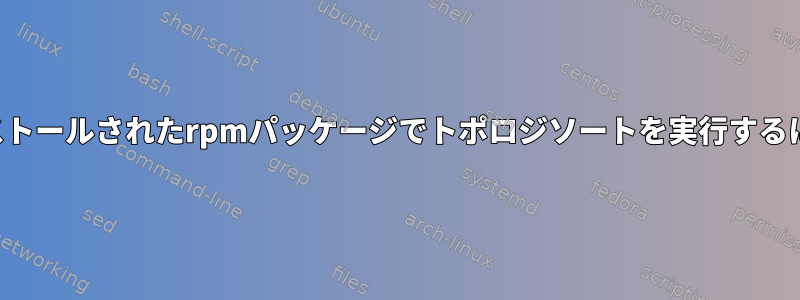
依存関係に基づいて、Fedoraにインストールされているすべてのrpmパッケージをトポロジでソートしたいと思います。最も必要なパッケージは一番上にあり(glibcなど)、最も必要とされないパッケージは一番下にあります。インストールされているすべてのパッケージを一覧表示できますが、位相が揃ってrpm -qaいないようです。
私の目標は、インストールされているパッケージを確認し、不要になったパッケージを見つけて削除することです。
答え1
rpmgraph(8) - Linux man page
Name
rpmgraph - Display RPM Package Dependency Graph
Synopsis
rpmgraph PACKAGE_FILE ...
Description
rpmgraph uses PACKAGE_FILE arguments to generate a package dependency graph. Each
PACKAGE_FILE argument is read and added to an rpm transaction set. The elements
of the transaction set
are partially ordered using a topological sort.
The partially ordered elements are then printed to standard output.
Nodes in the dependency graph are package names, and edges in the directed graph
point to the parent of each node. The parent node is defined as the last
predecessor of a package when partially ordered using the package dependencies as
a relation. That means that the parent of a given package is the package's last
prerequisite.
The output is in dot(1) directed graph format, and can be displayed or printed
using the dotty graph editor from the graphviz package. There are no rpmgraph
specific options, only common rpm options. See the rpmgraph usage message for
what is currently implemented.
[1]: https://linux.die.net/man/8/rpmgraph
取付ける:
rpm-devel fedora 19にはこのパッケージがあります
パッケージマネージャを使用してください。
dnf install rpm-devel
wgetにインストールするには、CentOSターミナルウィンドウに次のように入力します。
sudo yum install wget
wgetにインストールするには、Fedora次のように入力します。
sudo dnf install wget
これで、wgetコマンドを使用して必要な.rpmファイルをダウンロードできます。次のように入力します。
wget http://some_website/sample_file.rpm
システムはウェブサイトにアクセスし、現在の作業ディレクトリにファイルをダウンロードする必要があります。
RPMコマンドを使用したRPMファイルのインストール
FedoraLinux に .rpm パッケージをインストールするには、CentOS次のように入力します。
sudo rpm –i sample_file.rpm
-i スイッチはパッケージマネージャにファイルをインストールすることを通知します。
RPMインストーラの詳細については、次を参照してください。タコメーター文書。
Yumを使用したRPMファイルのインストール
または、パッケージマネージャを使用してファイルをyumインストールできます。.rpm
次のように入力します。
sudo yum localinstall sample_file.rpm
このlocalinstallオプションは、yumに現在の作業ディレクトリ内のインストールファイルを見つけるように指示します。
https://superuser.com/questions/483307/how-do-i-know-dependent-rpms-of-aa-package
https://phoenixnap.com/kb/how-to-install-rpm-file-centos-linux
https://linux.die.net/man/8/rpm
編集する:
操作できませんrpmgraph。 3つの異なるバージョンのパッケージリストを構文しようとしましたが、PACKAGE_FILEエラーのみが発生します。このプログラムの使い方を知っている場合は、回答を提供するか、私を編集してください。でテストされましたFedora 28。.rpm 拡張子を使用してインストールされたすべてのパッケージを一覧表示する方法。 Fedora、Centus、Red Hat
# rpmgraph INSTALLED_PACKAGES
(null): read manifest failed:
答え2
rpmdep数回検索した結果、パッケージに含まれているツールがrpmorphan私が望むものに最も近いようでした。最もインストールされている必須パッケージを表示するには、次の手順を--depending実行します。
rpmdep -all --depending | tac | less -S
答え3
私はかつてこれのスクリプトを直接書いていましたが、ほとんど使用しませんでした。
取締役は慎重に処理いたします。一度は「SimplyHTML」というパッケージが「リーフノード」として現れて削除しようとしたところ、「freemind」(私がよく使うマインドマッピングツール)に必要だということを知っても削除されました。 。非常に奇妙な!
とにかく、以下はスクリプトです(私のシステムでは「leaf-rpms」と呼ばれます)。
#!/usr/bin/perl
use strict;
use warnings;
use 5.10.0;
use Data::Dumper;
# a leaf RPM is one that has no deps and you can safely delete
# run it as is, delete any that you think are useless
my @installed = `rpm -qa --queryformat="%{NAME}\n"`;
chomp(@installed);
my %count;
@ARGV = ("dnf repograph |");
while (<>) {
chomp;
next if /^digraph packages/;
next unless m({) .. m(});
next if m({) or m(});
s/"//g;
$count{$_}++;
}
# print Dumper \@installed;
# print Dumper \@all;
# print Dumper \%count;
# print "----\n";
my %dup;
for my $k (sort @installed) {
next if $dup{$k}++;
print "$k\n" unless exists $count{$k};
}


